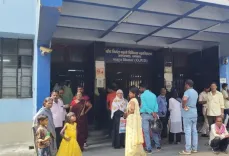South Korea Reports New Cases of Avian Influenza, Total Reaches 46

Synopsis
Key Takeaways
- South Korea confirms 46 cases of avian influenza.
- New outbreaks are reported in Cheongju and Asan.
- Initial response teams are deployed to affected farms.
- Intensive inspections are underway to prevent further spread.
- 1.8% of 77.6 million chickens have been culled since October.
Seoul, April 5 (NationPress) South Korea has confirmed new instances of highly pathogenic avian influenza, bringing the cumulative count of infections for this season to 46, as stated by the government on Saturday.
The Central Disaster Management Headquarters reported that the latest outbreaks occurred at poultry farms in the central cities of Cheongju and Asan.
In response, authorities have deployed initial response teams to the affected farms to regulate access, execute culling operations, and conduct comprehensive epidemiological investigations.
To avert further transmission and ensure prompt identification of potential infections, the government is performing rigorous inspections.
Notably, South Korea confirmed four additional cases of highly pathogenic avian influenza (AI) within a week, as indicated by the agriculture ministry earlier this week.
The four cases were reported at poultry farms in three nearby cities in the central region—Cheonan, Sejong, and Cheongju—since Wednesday, as per the Ministry of Agriculture, Food and Rural Affairs. The latest outbreak occurred at a poultry farm in Sejong, which houses approximately 89,000 chickens.
The nation experienced its first outbreak for the season on October 29.
Officials have stated that necessary actions are being taken to prevent further spread of the virus, urging livestock industry workers nationwide to sanitize their farms, facilities, and vehicles by Wednesday.
The ministry noted that the most recent AI cases are anticipated to have a limited effect on the domestic supply of eggs, but they will continue to monitor the situation closely.
Since late October, around 1.8 percent of 77.6 million chickens at poultry farms across the country have been culled due to bird flu, according to the ministry.
The avian influenza antigens of the H5 strain were earlier discovered in a deceased wild mammal in the first case reported in South Korea. The bird flu antigens were identified in the body of a wild leopard cat found near a reservoir in the southwestern county of Hwasun, located 277 kilometers south of Seoul.








